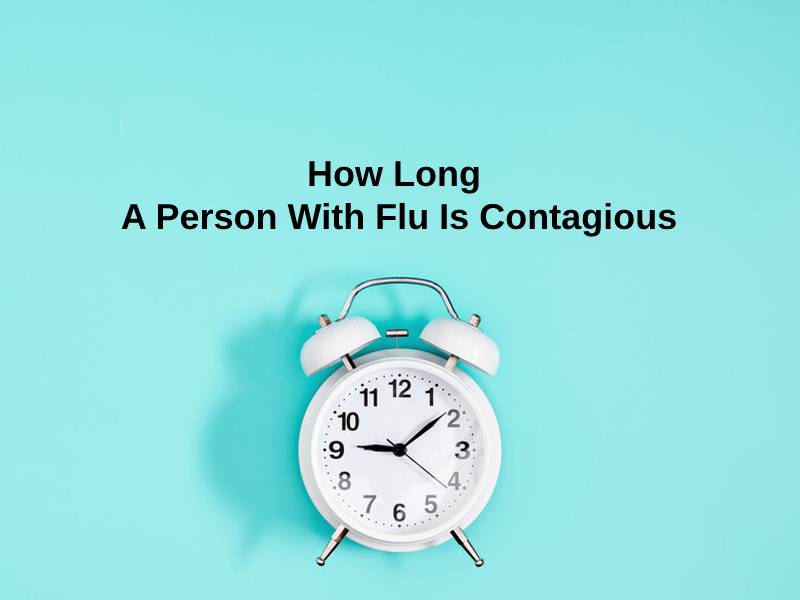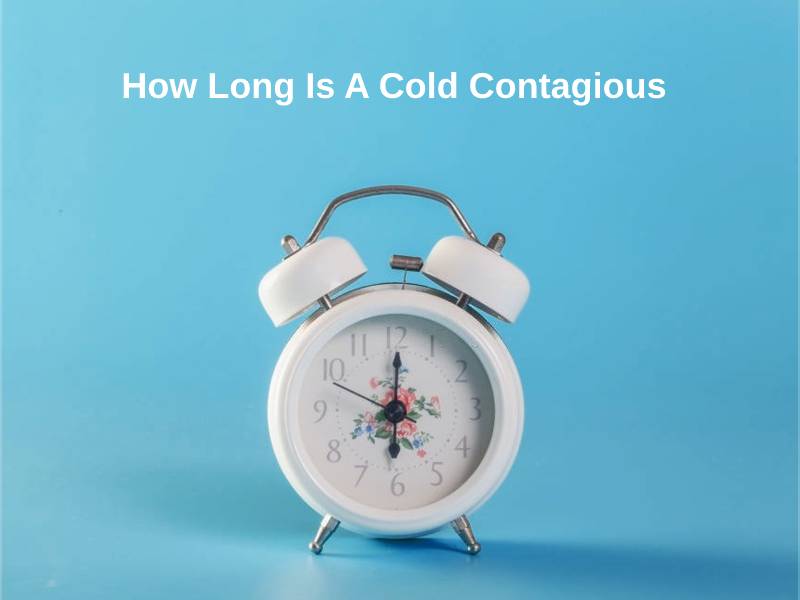Exact Answer: 1-2 weeks
Everyone gets sick from a common cold or the flu at least once in their lives, and it’s a miserable period of time. Your head can be congested, you may feel a lot of bodily aches and overall pain, your throat may be sore, and you may even cough a lot! These are all signs that may indicate that you’ve caught a common cold or the flu.
These can be highly contagious so it’s important to stay home and take remedies for your condition. It is better to stay away from other people as you may pass on the virus to them, subjecting them too to either the cold or flu.

How Long After Sick Are You Contagious?
| Type of illness | Duration for which you’re contagious |
| Cold | 1-2 days before symptoms up to 2 weeks |
| Flu | 1 day before symptoms to 1 week |
| Flu turns into pneumonia or other complications | 1 day before symptoms 2-3 weeks |
The common cold can be caused by many different viruses. They cause viral infections in your throat and nose. Essentially, the common cold affects the upper respiratory tract.
The common cold can be harmless, but you may still feel sick for as long as your symptoms last. This can even be up to 2 weeks after you become sick. For the common cold, you become contagious 1 to 2 days before your symptoms begin to appear. In addition, this period of being contagious lasts for as long as the symptoms last, which can mean that you may be contagious for up to 2 weeks at most.
Symptoms of a cold include a hacking cough, sore throat, sneezing, low fever, runny or blocked nose, congestion, bodily aches, headache, and more.
The influenza virus is responsible for causing the flu. The influenza virus affects the nose, lungs, and throat, which make up the respiratory system. The flu is mostly harmless, but it has the possibility of turning into more serious complications such as pneumonia.

Symptoms of the flu include the sudden onset of a fever, headache, dry and hacking cough, shortness of breath, runny or blocked nose, eye pain, chills, sweats, muscle aches, overall weakness, vomiting, and sometimes even diarrhea. The difference between the cold and the flu is that the symptoms develop slower with a cold, whereas the symptoms for the flu appear all of a sudden.
For the flu, you become contagious at least 1 day before your symptoms start to appear, and you remain contagious for the next week or so. But if your flu turns into more serious conditions such as pneumonia, then you’re contagious for a week or two longer.
Why Are You Contagious For That Long After Getting Sick?
You stay contagious for that particular amount of time because that’s what your symptoms are at their peak. This is when the virus is most active and in control, so it is easier to spread to others during this time.
Cold and flu viruses are contagious because they can easily spread to other people. They can spread when you cough or sneeze around other people.
These viruses can also remain on surfaces, making them contaminated. If you touch these surfaces and then proceed to touch other people or even your own eyes, mouth, or nose, then the virus can spread and enter the body, making them contagious.
When you cough or sneeze, the viruses are in the droplets that are expelled from the body. These droplets then land on many surfaces including other people. Then these viruses enter their bodies, and this is how the virus spreads.

In order to prevent or cut down the transmission of such viruses, you must follow certain safety protocols. If you feel sick and if you think that you may the flu or cold, then it is important to avoid all contact with other people. You should always cover your nose and mouth when you sneeze or cough to avoid the droplets from contaminating other surfaces.
To avoid getting sick, then you must remember to always wash your hands, and not touch your nose, mouth, or eyes. You must also regularly clean and sanitize the surfaces around you. In addition, you should avoid sharing bottles, glasses, or other utensils so the virus doesn’t spread.
Conclusion
In conclusion, we can understand that although the cold and the flu have almost the same type of symptoms, they are caused by two different viruses. But, both of them make the person contagious for different periods of time.
Regardless of whether you have a cold or the flu, you are advised to stay at home and take treatments for your condition. It is best to take time off of work too. This is to avoid spreading the virus to other people.
During this time, you can drink many fluids, hot foods, and rest for a lot of time, so your body has the time to recuperate and come back to normal.





















The detailed explanation sheds light on how easily these viruses can be transmitted, but also how we can prevent it.
Right, people need to make informed choices to protect their health and others around them.
Absolutely, it’s about taking personal responsibility in stopping the spread.
It’s as much about personal behaviors as it is about public health measures in containing these contagious viruses.
Correct, we all play a role in stopping the spread of cold and flu.
It’s clear that being mindful of how contagious these illnesses are plays a key role in preventing them from spreading.
Perhaps if more people understood this, we could minimize the spread of cold and flu viruses.
Definitely, awareness is critical for reducing the risk of transmission.
The information presented highlights the importance of taking appropriate measures to avoid viral transmission.
Indeed, knowing this should encourage everyone to practice good hygiene and stay home when sick.
Absolutely, it’s a shared responsibility to limit the spread of these viruses.
It’s always good to be informed and aware of how contagious colds and flu can be.
I agree! Knowing this information can help keep others around you safe.
The contagious period is quite long, which makes it essential to take precautions to avoid spreading illness.
Absolutely, especially considering how easily these viruses can be transmitted.
It’s remarkable how fast these viruses can spread, but also preventable if we follow safety protocols.
Agreed, it’s crucial to practice good hygiene to prevent the spread of cold and flu viruses.
Not following these protocols can have serious consequences for ourselves and others.
The symptoms of cold and flu can be quite similar, but it’s the duration of being contagious that’s significantly different.
Exactly, and that difference affects how we should handle each illness.
I never realized the flu virus could lead to pneumonia or other serious complications.
Yes, it’s often overlooked. That’s why it’s important to take the flu seriously.
The contagious nature of colds and flu makes it clear why proper education and awareness are crucial for prevention.
Indeed, understanding how contagious these illnesses are can change how people approach prevention.
Absolutely, knowledge is powerful in combating the spread of these viruses.